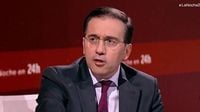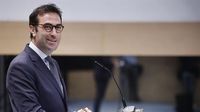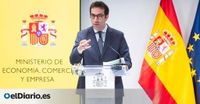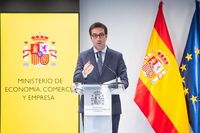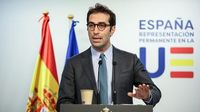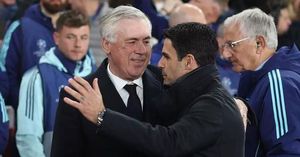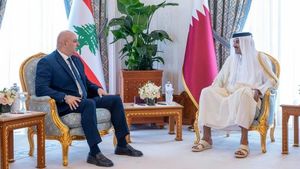In a climate of rising trade tensions between Europe and the United States, Carlos Cuerpo, the Spanish Minister of Economy, Trade, and Business, embarked on a significant trip to Washington on Monday, April 14, 2025. His agenda, originally planned long before, has taken on new political implications following recent comments from U.S. Treasury Secretary Scott Bessent regarding a meeting between Spanish Prime Minister Pedro Sánchez and Chinese President Xi Jinping.
The primary aim of Cuerpo's visit is to solidify economic relations with one of Spain's most crucial trading partners. "Tomorrow I will hold an institutional meeting with my U.S. counterpart, Secretary of the Treasury, where we will discuss all relevant bilateral issues to reinforce relations between Spain and the United States, which have been growing in recent years and are currently at one of their best moments," Cuerpo stated to a group of foreign correspondents.
However, the timing of this meeting coincides with Bessent's recent criticism of Spain's approach to China, where he remarked that aligning more closely with China would be akin to "cutting one’s own throat." Cuerpo emphasized that the meeting with Bessent, a staunch supporter of Donald Trump's tariffs, is not intended to discuss customs negotiations, as that matter falls exclusively under the European Trade Commissioner.
Last week, the Trump administration announced a partial 90-day moratorium on tariffs, a move that Cuerpo described as "an open door" to negotiations that Spain has persistently advocated since the onset of the trade conflict. "We have much to protect," he asserted, noting the daily exchange of 4.4 billion euros in goods and services across the Atlantic, which he referred to as a treasure that must be preserved.
In a coordinated response, the European Union also announced its own moratorium, a gesture that has begun to yield positive results. This was evidenced by negotiations that commenced on April 14, 2025, between Maroš Šefčovič, the European Commissioner for Trade, and Don Graves, the U.S. Secretary of Commerce, aimed at making the 90-day tariff truce permanent. Cuerpo remarked, "This is an important moment to see if we can all reach a negotiated solution that would be very beneficial for both parties."
As part of his itinerary in Washington, Cuerpo is also set to meet with Ajay Banga, the President of the World Bank, and several U.S. business leaders interested in expanding their operations in Spain. The stated goal is to enhance Spain's attractiveness as a destination for foreign investment and to position it as a key partner within the European framework.
Spain's government has calculated that approximately 80% of Spanish exports to the U.S. will be affected by tariffs. Cuerpo emphasized the importance of protecting and improving the relationship with the U.S., which is Spain's most significant trading partner outside the EU. He highlighted that in 2024 alone, Spain and the U.S. exchanged a total of 45 billion euros in goods.
During a press briefing, Cuerpo reiterated the significance of the economic ties, stating, "Every day, 4.4 billion euros worth of goods and services cross the Atlantic. This is a treasure we must protect, which is why we have been pushing for a negotiated solution with the United States." He also noted that the U.S. is the primary destination for Spanish investments, with Spanish firms holding around 90 billion euros in investments in the U.S. and the U.S. investing approximately 115 billion euros in Spain.
The backdrop of Cuerpo's visit is a tense trade environment, exacerbated by the Trump administration's tariffs that have created uncertainty in the global economy. The Spanish government views these meetings as an opportunity to address bilateral issues and strengthen ties with the U.S., which they believe are at one of their best points in recent history.
Cuerpo's meetings in Washington are seen as a natural extension of European diplomatic efforts, occurring just a day after European Trade Commissioner Šefčovič's discussions with U.S. counterparts. The Spanish delegation's visit is characterized by continuous coordination with the European Commission, ensuring that their messages align as they seek to navigate the complexities of transatlantic trade relations.
As the trade war continues to unfold, the stakes are high for Spain and the EU. The outcome of Cuerpo's meetings could potentially shape the future of economic relations between these key players, making this visit critical not just for Spain but for the broader European economic landscape.
